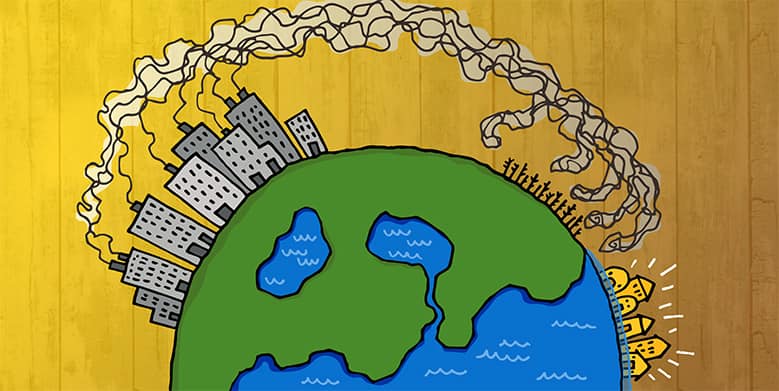November 30, 2015
As the 21st UN Climate Summit kicks off in Paris (affectionately known as COP21), we’re hearing plenty about our warmer and warmer future. The 190 countries meeting in Paris have submitted “Intended Nationally Determined Contributions,” policy-speak for public commitments to reduce carbon emissions. The goal is preventing our world from warming up another 2 degrees Celsius— the tipping point for the worst impacts of climate change.

We know that climate change is already having a disproportionately high impact on poor and developing countries, and the effects are only going to get worse in the next century. Another key piece of the Paris negotiation is who these changes are impacting the most, and how we’re supposed to help them. Welcome to the age of climate justice.
Climate Change Isn’t Equal Opportunity
Climate Justice is a concept that acknowledges that fossil fuel-powered modernity has unequally benefited the richest countries, while disproportionately impacting poorer people and developing countries around the world. For example, in Africa, where farmers have no safety net when their crops fail, climate change’s pressure on agriculture is exacerbating existing inequalities.
Around the world, people in developing countries are migrating toward urban centers in search of work. But climate change is threatening basic natural resources, including water, while increasing the incidence of natural disasters, like hurricanes and typhoons, that wreak havoc on coastal regions. The slums that surround cities in developing countries already suffer from a severe lack of infrastructure, and all of the impacts of climate change only intensify the divide between those living in a shanty and those living in a downtown skyrise.
In the US, rising sea levels due to climate change will displace poorer communities, and we’ve already seen how hurricanes like Katrina devastate disadvantaged coastal neighborhoods. In fact, four of the top ten cities most vulnerable to damaging floods are in the US. The same study predicts flood damage to cities around the world will cost $1 trillion a year if cities don’t take steps to adapt. Study after study shows how poor communities and people of color are disproportionately affected by pollution from mountain top removal, power plants, toxic waste, car smog and a whole host of environmental health hazards.
The Cost of Adaptation Should be Shared
Across the globe, climate change is already costing $1.2 trillion a year, and is forecast to demand $67 billion in aid to help developing countries adapt. For all these reasons and more, we need to tune into the who of climate change. The International Bar Association (IBA), the global organization representing the legal profession, has released a new report outlining how we need to tackle this growing problem. Meanwhile, the United Nations Green Climate Fund (GCF) aims to do just that, with the goal of securing financial commitments from wealthy nations that accelerate investments in developing economies that cut emissions, expand renewable energy, and adapt to the impacts of climate change that are already being felt.
But when it comes to actually signing these efforts into a legally binding agreement in Paris, we need to make sure that adaptation support is synchronized to the amount of carbon countries are committing to cut. It’s a simple relationship. The more carbon we reduce now, the less we need to adapt to climate change later on; the less we cut carbon, the more we’re going to need to spend to adapt. And the world needs to be prepared to leverage massive capital. The COP21 countries are committing to mobilizing $100 billion each year adaptation. Let’s make sure we get firm plans for financing these efforts, now and in the future.
Join The Climate Movement
-
With a landmark climate action agreement in place including commitments from 196 countries to fight climate change, now is the time to keep the pressure on and ensure swift action. This climate agreement wouldn’t have happened without millions of people around the world taking action. And we won’t be able to meet the ambitious goals of the Paris Agreement without millions and millions more people taking action in support of a rapid transition to clean energy. Paris was just the beginning, not the end. Let’s get to work towards a greener, cleaner future. Add your voice to the millions demanding action and sign the petition today!
Sign the Petition Now!
Join The Climate Movement
-
With a landmark climate action agreement in place including commitments from 196 countries to fight climate change, now is the time to keep the pressure on and ensure swift action. This climate agreement wouldn’t have happened without millions of people around the world taking action. And we won’t be able to meet the ambitious goals of the Paris Agreement without millions and millions more people taking action in support of a rapid transition to clean energy. Paris was just the beginning, not the end. Let’s get to work towards a greener, cleaner future. Add your voice to the millions demanding action and sign the petition today!